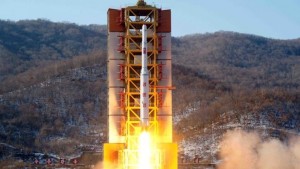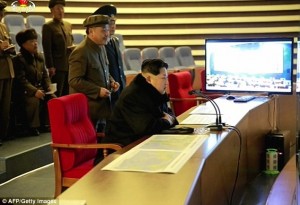Seeing North Korea again test an atomic bomb and long range missile is like watching a movie you’ve seen before.
The UN Security Council will meet. New sanctions will be put on North Korea. China will condemn the events.
And nothing, really, will happen.
The White House will do a review of its policy toward North Korea by asking staffers for new ideas.
There won’t be any, at least within the box of the “no escalation” premise that has confined US policy for years.
Yet it would be a mistake to think that this “same old, same old” policy is playing out again.
In my book on The Second Nuclear Age (Times Books, 2012) I emphasized the importance of looking at strategic problems both from a short term point of view, and from a longer term multi-year perspective.
Some security challenges are best thought of as what can be termed “important, but not necessarily urgent.”

North Korea said the rocket it launched on the morning of 7 February was to put a satellite into orbit around the earth. Credit: BBC
They can go on for a long time and nothing dire happens.
But they contain the seeds of larger issues that strengthen — and ultimately make the problem impossible to ignore in a much more deadly way.
The likelihood of a North Korean attack on South Korea or Japan does not appear any greater today than it did one year ago, or five years ago. We could be wrong about this. But it seems reasonable to believe that while North Korea’s nuclear missile build up isn’t a good thing, it also isn’t urgent. It can be passed on to the next Administration, or kicked down the road beyond that.
This is the common view in Washington decision making circles.
Urgent problems in the Middle East push North Korea off the agenda.
I want to argue that this is one way that North Korea’s recent nuclear and missile tests matter.
They expose a large failure in policy imagination: an inability to distinguish between urgent issues like ISIS, and issues that are important — but not necessarily urgent.
One danger of being the sole superpower is over extension.
But another is of overwhelm by immediate, urgent issues.
This focus means that important issues are repeatedly kicked down the road.
Policy is a mixture of the immediate tastes and intuitions of the moment when the urgent issue arrives.
Short term drives out the long term — every time.
This is what’s happened with North Korea.
Pyongyang has a nuclear ICBM program that either is capable of hitting South Korea, Japan, and the United States, or that soon will be. It has done this with safety and reliability features that would never be acceptable in the United States.
If North Korea ever launched this force, it might not work.
But then again, it might.
Talk about deterrence.
This is a very different kind of deterrent than anything seen before in nuclear diplomacy.
Here is another feature of the second nuclear age.
Strategy innovation that goes beyond the limits of our imagination and cultural appreciation.
Most of what is thought about nuclear strategy in the West still derives from a long term game between two industrial powers maneuvering for control of Europe and the developing war.
This was the cold war.
It has little to do with strategy innovations of the second nuclear age.
Can anyone seriously maintain the North Korea seeks security by possession of a secure second strike force?
Everything we know about this force points to a very different strategic concept than this.
The tendency in the United States is to see problems with a strong bias toward the urgent even in the way we break them down.

North Korean leader Kim Jong-Un watched the rocket launch from an secret planning room. Credit: AFP Getty Images
In game theory there’s something called the Colonel Blotto game. Two opponents allocate forces to several battlefields. They do this to build advantage so they can win the overall war, e.g. take two out of three battlefields.
Or they maneuver forces across battlefields to increase tensions to increase their opponent’s caution.
North Korea is a “battlefield,” a front, in the larger strategic competition between the United States and China.
Taiwan’s security, the new man-made islands in the South China Sea, and North Korea are the three fronts in this rivalry.
Think of these as three as a Colonel Blotto game.
The US tries to negotiate over them individually, in isolation from one another.
For example, the man made Chinese islands are handled with a B-52 flyover, a freedom of navigation (FONOP) operation naval patrol, and some unsuccessful maneuvering in ASEAN to get the problem on the agenda.
I could describe in similar manner how Taiwan’s security and North Korea’s nuclear missiles are treated, entirely in their own terms.
What the US approach overlooks is game theory’s central insight that connecting individual strategies across the fronts creates an altogether more effective approach.
Increasing tensions in the South China Sea keeps the United States from pressing too hard against North Korea. If the US could get China to play this game as if it were three independent issues this would clearly be to Washington’s gain.
But China sees that negotiating this three way shell game gives it a lot more than dealing with only one shell at a time. Should the US escalate — it can counter not only in the immediate front of contention, but in the others as well.
As long as the United States attends to each challenge in terms of its immediate urgency it will get whipsawed by such strategies.
If Washington, for example, continues its naval guerilla war in the South China Sea, Beijing will tolerate even more outrageous North Korean behavior.
It will build even more missiles against Taiwan — conventional and nuclear — to keep the United States off balance.
The biggest danger of focusing on the urgent is that it misses the bigger picture.
Understanding this picture was the reason the cold war didn’t turn hot.
The United States won because it understood the rules of the game.
New rules for a second nuclear age are forming now, right before our eyes.
It’s time to see that these are the important lessons of North Korea’s recent launch and tests.
Also, see the following:



Leave a Reply